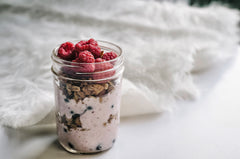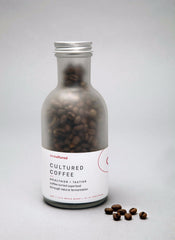Cultured Foods and Your Health
Cultured foods have been part of a healthy diet for millennia.
In this blog post we explore what sets cultured, or fermented, foods apart and how to ensure you're getting the right balance of cultured food in your diet every day.
Cultured Food - The Science
Cultured food refers to foods that have been fermented.
Fermentation is when microbes, single-celled or clusters of single-celled organisms not visible to the naked eye, cultivate a foodstuff. In particular, microbes like yeast or certain beneficial bacteria work to convert carbohydrates into alcohol, more digestible protein or other nutrients.
 By converting one substance into another, more easily digestible form, microbes help increase food's bioavailability. That means it's easier to obtain nutrition from the food.
By converting one substance into another, more easily digestible form, microbes help increase food's bioavailability. That means it's easier to obtain nutrition from the food.
In addition, culturing food unlocks specific nutritional elements like extra vitamins and protein that would otherwise be hard for our bodies to absorb.
As microbes break down food into more digestible components, they make it easier for people with food sensitivities and intolerances to digest too. For example, it's what makes Cultured Coffee less likely to trigger acid reflux or heartburn in sufferers!
Cultured Foods and The Body

Cultured food is not only easier for your body to digest, it also plays an important role in building and maintaining a healthy gut microbiota, the network of healthy bacteria inside our bodies.
This network stretches throughout our entire digestive system and houses over a hundred trillion bacteria. In particular, healthy microbes can be found along the small intestine, the body's digestion and powerhouse for absorbing nutrition from food, and large intestine, where indigestible food waste starts to make its way out of our bodies.
Many of the trillions of bacteria in our gut aren't native to the human body. Instead, they've developed a symbiotic relationship with us over millennia after being ingested as probiotics on food or even inhaled from the air we breathe. Many help to extract the nutrients from the food we eat and allow those nutrients to be transferred into the bloodstream.
Modern research has shown they're also responsible for a host of other functions like our mood, overall wellbeing and even weight!
Cultivating Good Cultures - Pro and Prebiotics

The food we eat not only impacts our health but the health and types of bacteria inside our digestive systems.
Eating a range of probiotics and prebiotics (substances the good bacteria need to grow) is key to maintaining a healthy community of gut microbes.
Any fermented food that contains live beneficial bacteria is considered a probiotic. Probiotics maintain and top up the level of healthy microbes in our gut.
Prebiotics are typically foods high in fibrous compounds that aren't easily broken down in our digestive system. Examples include chicory root, Jerusalem artichoke, dandelion, alliums, asparagus and bananas.
A lack of prebiotics or imbalance of the right microbes in our gut due to diet or medication can lead to systemic malnutrition and illnesses such as Irritable Bowel Syndrome. Eating a range of fresh and cultured foods can help maintain the integrity of your overall digestive system.
Cultured Foods - Examples
Culturing, or fermentation, can occur in a wide range of foods and beverages including liquids, solid grains, vegetables, beans, dairy, meat, fish, tea, coffee and beyond!
Every human culture has embraced the science (and tastiness) of fermentation, some of the most famous examples of which are: kimchi, tempeh, tofu, cheese, wine, beer, kombucha and sauerkraut.
While all fermented foods were originally a product of spontaneous natural fermentation, nowadays some products like yoghurt, cheese, wine and beer are crafted using cultures managed on an industrial scale. Other foods, such as sauerkraut, still rely on airborne microbes to culture the food.
The New Wave of Cultured Foods
Now a new wave of food startups like our fermentation innovation lab Afineur, eatCultured and beyond are working to craft foods in partnership with natural microbes.
Thanks to modern technology, we're learning a lot more about the role of individual microbes and how they can be of benefit in our diets. By working selectively with individual microbes, the next generation of cultured foods will not only boast more consistent flavor profiles but also more consistent and targeted health benefits.
Finally microbes have the potential to solve some of the greatest challenges today, such as food waste. For more about that, stay tuned!
 Learn more about eatCultured's first healthy fermented product: Cultured Coffee
Learn more about eatCultured's first healthy fermented product: Cultured Coffee

Leave a comment
Please note, comments must be approved before they are published